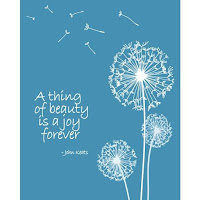A Thing of Beauty (detailed analysis & explanation)
A Thing of Beauty is a poem written by the famous romantic poet, John Keats. The poem tells about how nature and its wonder mesmerize us and take away all the sorrow that surrounds us from time to time. The following explanation might aid you in understanding this exceptional piece of work in poetry.
Background
Endymion is an epic poem in English. This poem by Keats is based on the Greek mythology of Endymion, the shepherd beloved by the moon goddess Selene. We see an elaboration of the original story and the moon Goddess Selene is named as “Cynthia”.
The poem equates Endymion’s original romantic ardor with a more universal quest for a self-destroying transcendence in which he might achieve a blissful personal unity with all creation.
Endymios in Greek mythology is a story of a handsome youth who spent much of his life sleeping. There are different views related to Endymion. According to some tradition Endymion was the king of Elis. Several traditions say that he was offered by Zeus to choose anything he might desire and Endymionin order to remain young forever chose an everlasting sleep.
While some tradition says Endymion’s eternal sleep was a punishment given by Zeus, because Endymion fell in love with Zeus’s wife Hera. Selene was deeply in love with Endymion, some say Selene had cursed Endymion into everlasting sleep so that she can enjoy him all by herself.
Selene’s love for Endymion made her visit him every night while he was asleep. But in the poem Keats emphasizes on Endymion’s love for Diana rather than on hers for him. Keats transformed this tale into prose to express the loves that have been felt on imaginative longings.
This theme of love is determined in the adventure of the Endymion quest by Diana. In the search for Diana Endymion falls in love with an earthly maiden. But in the end Diana and the earthly maiden turn out to be one and the same.
Poem
A thing of beauty is a joy forever
Its loveliness increases, it will never
Pass into nothingness; but will keep
A bower quiet for us, and a sleep
Full of sweet dreams, and health, and quiet breathing.
Very simply put, yet poetic, Keats describes a thing of beauty as emanating joy forever. Its beauty only increases and it will never cease. The benefits proffered by a thing of beauty are listed as giving sound rest with good dreams and well-being.
Therefore, on every morrow, are we wreathing
A flowery band to bind us to the earth,
Spite of despondence, of the inhuman dearth
Of noble natures, of the gloomy days,
Of all the unhealthy and o’er-darkened ways
Made for our searching: yes, in spite of all,
Some shape of beauty moves away the pall
From our dark spirits…
The earth minus the beautiful things is a despondent, spiteful place thriving in callous insensitive dearth and is harsh toward human beings. Every day human beings face gloomy days packed with unhealthy spite and darkness. However, in spite of all, a thing of beauty helps remove the dark cloud that burdens our souls. Hence, the poet says that we – human beings – each day create an ornate band, made of all the lovely things we see. This band keeps us bound to the despondent earth – as we would otherwise be hopeless.
… Such the sun, the moon,
Trees old, and young, sprouting a shady boon
For simple sheep; and such are daffodils
With the green world they live in; and clear rills
That for themselves a cooling covert make
‘Gainst the hot season; the mid forest brake,
Rich with a sparkling of fair musk-rose blooms;
And such too is the grandeur of the dooms
We have imagined for the mighty dead;
All lovely tales that we have heard or read;
An endless fountain of immortal drink,
Pouring unto us from the heaven’s brink.
This closing paragraph simply tells us some of the beautiful things on Earth. After all, beauty lies in the eyes of the beholder – Everyone can highlight something beautiful in anything. The examples cited by the poet are as such: the sun, the moon, trees, flowers, streams, musk-rose blooms, architectural sepulchers, even fairy tales or heroic legends. The ‘simple sheep’ are human beings – the poet sympathizes with the innocence of human beings. Keats sees the beauty in innocent humans seeking solace in nature, and Mother Nature in its own way sprouts a shady abode of relief and consolation. The expression ‘Lily of the valley’ is quite well known and rouses images of a delicate lone white flower holding up its head amidst a setting of thorns and barbs and everything contrary in nature to delicateness – so too are the daffodils mentioned in the poem.
The poet also sees beauty in the death of martyrs and legends. ‘The mighty dead’ are those martyrs who have died bravely for a cause. We honor them by erecting magnificent, grand sepulchers in which beauty is seen. If one looks around, there are innumerable beautiful things to notice – they seem to flow immortally as a fountain, from the gods above to help the pitiable human beings to cope with the harshness of life.
Explanation
A beautiful thing is a source of eternal joy, its attractiveness grows with the passage of time and its impact never fades away. It is as pleasant as a cool quiet bower or sound sleep with sweet dreams; or robust health and mental peace. It provides the beholder with a haven of tranquility and solace.
It is the beauty of nature that keeps us attached to this earth. Every morning we collect fresh lovely flowers and prepare garlands. The fascination for flowers is our bonding with the earth. It helps us steer clear of despondency and disappointments. We forget all our despair, of acute shortage of noble souls, of misfortunes that overtake us to test our forbearance. Life is full of trials and tribulations and we often find ourselves in the midst of gloom. It is at such depressing moments that a sight full of beauty dispels the pall of sadness from our spirits making room for hope and optimism.
The objects of beauty are countless. These include heavenly bodies like the sun and the moon, the old and young trees that provide cool shelter to sleep, the daffodil flowers encased in green leaves, the streams that flow through a shady passage which they make themselves with plants, and the bushes that bear fragrant flowers. These simple and even commonplace things lift the human spirit filling it with joy and delight. In addition to these objects of nature, there are wonderful tales of our legendary heroes, who lived and died heroically, which inspire us with their matchless beauty. These beautiful things are metaphorically an endless source of nectar that pours down to us from heaven bringing eternal joy for the soul’s grandeur. They are like an elixir of life, a never diminishing source of pleasure and delight, an endless fountain of joy that seems to be a precious gift from Heaven.


